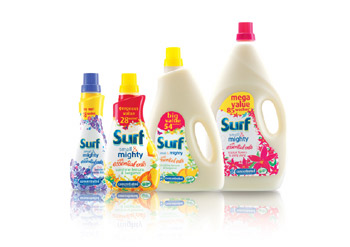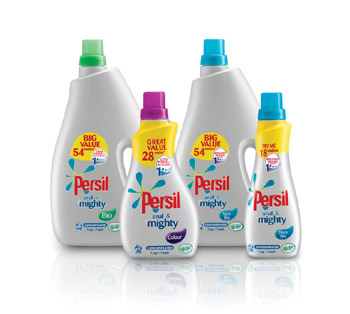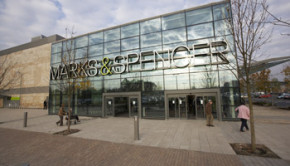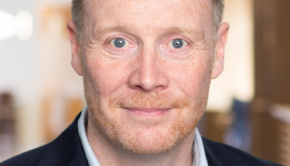10 Questions with….Conor Kilduff

Conor Kilduff, MD of Unilever, Ireland, discusses changes in consumer behaviour, a new competitive marketplace and Unilever’s large sustainability drive.
22 November 2010
A native of Athlone, Co. Westmeath, Kilduff completed a Masters in Business Studies (MBS) in Marketing at UCD. After a number of years working in various sales and marketing positions he became foods sales manager at Unilever in January 2001. At the end of that year, Kilduff became a director of the Unilever Board in Ireland. He moved back into marketing in mid 2004, when he was appointed business unit director for the foods portfolio. Four years later he became marketing director for the entire Unilever portfolio in Ireland (foods, ice cream and home & personal care products). He became managing director of Unilever Ireland in May 2009.
What have you found most challenging about the past few years in business?
As a consumer goods business, we have been affected by the recession in recent times. Decreased consumer demand coupled with higher promotional intensity has impacted our business in terms of turnover and profitabilty. In addition, the movement in the value of sterling versus euro has had a big impact. So, it has been challenging but we’ve managed to hold onto our market shares. We have very strong brands and hold number one and number two positions in 16 of the 18 categories in which we operate.
Unilever Ireland introduced a price reduction campaign in 2009. Was this effective?
Our price reduction campaign, which we introduced in Q4 of 2009, was a very big undertaking for us. We cut our prices by an average of 11% across 70% of our portfolio. This portfolio includes well known brands such as HB ice cream, Lyons Tea, Knorr, Flora, Hellmann’s, Persil, Surf, Comfort, Domestos, Cif, Sun, Dove, Sure and Lynx. To give you an idea of the scale of this campaign – we sell an average of 1.3 million products every day in Ireland. So, I think I can confidently say it was a far reaching and widespread! The reductions have resulted in a short term hit in terms of our bottom line. However, we’re pleased to have been able to support our retail customers through this difficult time with this campaign. Further, the reductions give us a platform from which we can grow our business in the future.
 The company is presently engaging in a large sustainability drive. How does this benefit the company?
The company is presently engaging in a large sustainability drive. How does this benefit the company?
Recently, our CEO, Paul Polman, outlined a bold new vision for the company on a global level, “double the size of our company, whilst reducing our environmental impact”. Sustainable development is central to our business strategy. We know that if we are to achieve our growth objectives we must reduce the total environmental impacts of the business. Our commitment covers not just our factories and offices but also the environmental impacts associated with sourcing our raw materials, through to how consumers use and dispose of our products. For example, Unilever’s detergent brands such as Persil and Surf are used in 125 billion washes a year. That is the equivalent of fourteen million washes every hour. Every time a Unilever consumer does the laundry at a lower temperature or with a full load, the reductions in energy, CO2 and water are cumulatively very large. With consumer usage accounting for around 70% of our greenhouse gas footprint, engaging consumers through initiatives such as our laundry category’s Cleaner Planet Plan will be key to achieving our vision.
 Do you think that consumers are bothered with these issues or is it just the product with the best price that really matters?
Do you think that consumers are bothered with these issues or is it just the product with the best price that really matters?
I think consumers are concerned about many issues. There are lots of factors that influence consumer buying behaviour. Price is a of course a key driver, especially in our current economic times. Interestingly, convenience is also at the top of their list. ‘Green’ issues and sustainability concerns are a primary motivator for a certain consumer segment and are further down the list for other consumers. However, if you take the long term view, which Unilever does, integrating sustainable development into our way of doing business is not a ‘nice to have’, but a ‘must do’.
We have always been a business driven by a strong set of values. Today, those values are as important as ever. We know that the well-being of society and the environment is critical to our ability to grow and to achieve our new vision of doubling the size of our business while reducing our overall environmental impact across our entire value chain. I strongly believe that making sustainable development a central part of our business strategy into the future will be rewarded by consumers over the long term.
 What do you think are the greatest challenges facing companies in Ireland today?
What do you think are the greatest challenges facing companies in Ireland today?
There are a number of key challenges as I see it. Creating liquidity again, particularly for smaller businesses, to be able to finance growth will be crucial. This will support a recovery and deliver jobs. Managing our cost base closely and carefully will help us to improve our international competitiveness and will encourage continued expansion of our global exports. Securing more certainty for consumers is hugely important as this can restore consumer confidence in the medium term and stimulate consumer demand. The Irish have been strong and resilient in the past and can be so again in order to deliver our recovery.
Finally, creating employment is now the single most important thing we must do to enable us to grow out of this recession. Improved liquidity, cost competitiveness and consumer confidence will be the key elements to deliver employment growth.
Do you think there needs to be more competition in the market place?
I think we operate in an extremely competitive marketplace. We have a fantastic grocery sector in Ireland and one of which I’m very proud. Whenever I bring European colleagues on store visits in Ireland, they are always highly impressed by the quality, range and service provided by our retailers. Our convenience sector is cutting-edge and in my opinion, amongst the best in Europe. Competition is healthy and absolutely necessary, it drives innovation, improves standards, helps our international competitiveness and ultimately benefits all parties.
 How have consumer behaviours changed in recent times?
How have consumer behaviours changed in recent times?
We are seeing changes in consumer behaviour as a result of the recession. They are becoming a lot more price-conscious, are shopping around more, are eating in and cooking at home more often. It is too simplistic to say, however, that recession leads to trading down in every category. In some discretionary categories, you do see significantly less value and volume as a result of the recession. However, there are other categories where a clear understanding of consumer needs – and innovating quickly to address them – can lead to consumers trading up both in volume and value terms. For example, for us, it’s been in ice cream with Magnum Gold and in the stocks market where Knorr Stockpot has been an outstanding success. It is in the depths of this understanding that we are able to gather insights that guide future innovations.
How do you see the grocery market evolving in 2011?
As I’ve said already, I believe the grocery market in Ireland is an extremely competitive and high quality one. It’s always been a competitive market but has become even more so now. Our largest retailers have done well in the recessionary environment and will continue to do so. The convenience trade has been under more pressure as consumer demand has fallen back somewhat. The credit shortage has affected some smaller retailers and, as I’ve already said, I would like to see improved liquidity in 2011. Continued high levels of unemployment in 2011 will continue to make consumers very price conscious and focused on getting the best deals. In summary, I see 2011 being another very tough year in the grocery sector.
 What are your future plans for the company?
What are your future plans for the company?
Over the past year, we’ve realigned our prices and will closely maintain our competitiveness for our retail customers into the future. We plan to grow the categories in which we operate and grow our own share within our categories. We want to continue to deliver great products for our consumers and do the right things with our brands to ensure we maintain their lifetime loyalty. Of course, we also plan to return to sustainable profit levels for our shareholders. Our commitment to our Irish operations remains as strong as ever. We’re focused on our Irish retail customers and consumers and have strong roots and a rich heritage in Ireland.
What is a typical day in your life like?
My average work day starts at 6am. When I get to the office (around 7am), I always make myself a strong cup of Lyons Tea and then get started. My average day can be varied, whether it is a day in the office, internal meetings, a trip to London, a day filled with customer meetings or a combination of all of the above. I enjoy the role immensely, partly because of the variety. No two days are the same and every day is filled with challenges. My days are very full and very busy. There is always a lot to be done and always more that can be done. I generally leave the office around 7pm in the evening.
Outside of work, I play squash, enjoy a little golf and am very involved in my local musical society. I am married to Aine and have two girls, Emma & Keelin, who are currently in college. Weekends are full and great fun.



 Print
Print






Fans 0
Followers